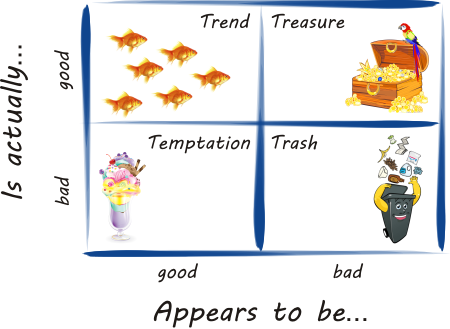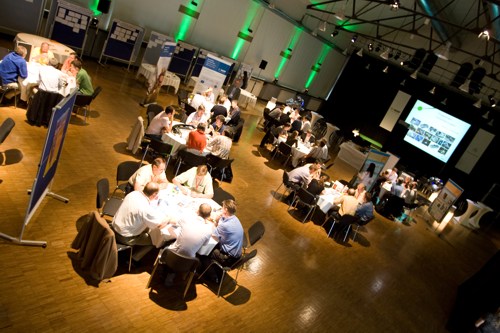
In an earlier post (in German), we presented our „4T“ model of idea quality. This model is useful in explaining potential evaluation errors to clients that can cost them either wasted time and money or a missed opportunity. The model distinguishes four types of idea:
- Trash: The idea appears to be bad and actually is bad.
- Temptation: The idea appears to be good, but is, in fact, bad.
- Trend: The idea both appears to be good, and actually is good.
- Treasure: The idea is, in fact, good, but appears to be bad.
Trend ideas and Trash ideas do not present a problem: they can be safely pursued and ignored, respectively. Temptations can be avoided using a set of reliable evaluation criteria. One example are the Is it real? questions by George Day (Our article in German).
The tricky issue is the question Trash or Treasure? As Peter Thiel famously pointed out in a lecture about startups, the very best ideas appear to be bad. (If they had appeared to be good, others would already have implemented them.) A Treasure idea can lead to a unique product that enjoys a monopoly in its market.
Bad and good ideas
An idea is good, if it brings a large reward. For a product or service, this typically means an increase in sales and/or market share. To achieve this, the product offers superior customer value and is easy for customers to adopt.
Ideas seem bad, because they conflict with the status quo – they appear to be difficult or even impossible to implement. 15 years ago, the idea of Airbnb seemed ridiculous to many (including myself!); after all, who wants to stay the night in a stranger’s apartment or let a complete stranger use their apartment? For this reason, teams from established companies usually want to reject ideas of this type. We have seen this happen many times in our workshops.
The Trash-or-Treasure question
However, there is a simple question that can protect you from rejecting Treasure:
How would we feel if we learned that a competitor had just implemented this idea?
If this question generates admiration, frustration or envy, then the idea is Treasure; the imaginary competitor has managed to overcome the difficulties and is now reaping the benefits.
The „Trash or Treasure“ question occupies a permanent place in our facilitator’s toolbox, and we never hesitate to get it out, if we feel that the group is about to reject a Treasure.
Link
Zuletzt aktualisiert am 24. April 2024 von Graham Horton
